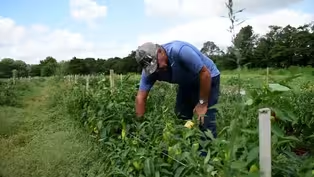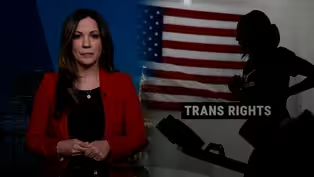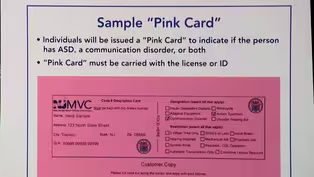NJ Spotlight News
The Change Project: Safe-consumption centers saving lives
Clip: 2/21/2025 | 6m 13sVideo has Closed Captions
Interview: Lilo H. Stainton, health care writer, NJ Spotlight News
A growing number of public health advocates in New Jersey and elsewhere are starting to embrace what some believe is a radical way to address opioid overdoses through what’s known as safe-consumption centers.
Problems playing video? | Closed Captioning Feedback
Problems playing video? | Closed Captioning Feedback
NJ Spotlight News is a local public television program presented by THIRTEEN PBS
NJ Spotlight News
The Change Project: Safe-consumption centers saving lives
Clip: 2/21/2025 | 6m 13sVideo has Closed Captions
A growing number of public health advocates in New Jersey and elsewhere are starting to embrace what some believe is a radical way to address opioid overdoses through what’s known as safe-consumption centers.
Problems playing video? | Closed Captioning Feedback
How to Watch NJ Spotlight News
NJ Spotlight News is available to stream on pbs.org and the free PBS App, available on iPhone, Apple TV, Android TV, Android smartphones, Amazon Fire TV, Amazon Fire Tablet, Roku, Samsung Smart TV, and Vizio.
Providing Support for PBS.org
Learn Moreabout PBS online sponsorshipWell, the growing number of public health advocates in New Jersey are starting to embrace what some believe is a radical way to address opioid overdoses through what's known as safe consumption centers.
It's a place where people use illegal drugs that they obtain elsewhere under the watchful eye of medical professionals who are ready to intervene at the slightest hint of overdose.
But they also offer wraparound services like mental health care and addiction treatment for those who want it.
Other states and countries have had significant success using the controversial model, and it could prove helpful here, too.
Health care writer Lilo Stainton dug into safe consumption centers as part of the Change project, where NJ Spotlight News looks at potential solutions to some of the state's toughest problems.
And she joins me now.
Lilo this is an excellent, excellent piece.
I have to just say that.
But there does important story.
It really is.
I mean, obviously, New Jersey's been grappling with the opioid opioid epidemic, as many states are.
But there is this real mix of support and pushback.
And you visited two different centers in New York and in Rhode Island.
And I'm just curious what you found to be the main reason for that resistance when, as you write, it's saving thousands of lives?
Right.
I think the data I mean, the data is clear, right?
Nobody's ever died at an overdose prevention center or a safe consumption site from drug use.
That's what everybody says and everything shows.
I think what people may not understand about the model is how how it impacts the community.
Drug use is here.
It's already a part of our world.
The drugs are getting far more powerful.
Police will tell you that.
Everybody will tell you.
Tell you that.
And it's really a question of do we truly want to meet people where they're at, which is what a lot of social service programs claim to be.
And if we do, this is the way to do it and save lives.
Right.
I think they also what people don't know is data that shows it will take litter off the streets, data that shows, you know, it will take other police then have less to worry about in terms of responding to overdoses.
In communities where this happens, we know it attracts a lot of police.
There are you know, how many times have you gone into a fast food place and the bathroom may have been locked or someone's in there and they may have overdosed or use drugs?
You know, this is a thing that's impacting a lot of people.
And this is a way, as the guy from the Drug Policy Alliance told me, this is a way to sort of contain that and we can bring it inside safely and we can take it, take care of it.
And and that's the argument for it.
And yet these centers, which New Jersey has not adopted yet, I mean, they operate with this sort of legal uncertainty.
Right.
Right.
I mean, they don't have any type of legal protection.
Well, yes, Well, it depends on state or so.
So state law.
Rhode Island has it in state law.
And they are the first state sanctioned when New York is a little more difficult.
It is sanctioned by the state, by the city government, but not by the state.
And then there's federal law.
And under the Biden administration, there has really been sort of a hands off and support for harm reduction.
And the courts have kind of taken a put a pause on any activity to try to to stop this.
We are now in a different a very, very different administration.
And so there's sort of a wait and see.
The people doing this work say we're going to continue to do this because it's proven to save lives.
You know, until someone comes and stops us.
And that hasn't happened yet.
So is that a barrier to them?
It's a barrier.
I don't think it's so much a barrier to them carrying out the work.
It is definitely a barrier to people starting it.
I heard this all over in New Jersey.
People who, you know, clearly support this model and are willing said to me we would.
But the uncertainty of doing something like this with this legal stance that is unknown is really hard.
And it puts you know, it's a it's a risk for for nonprofits that try to lay out the capital to do it.
It could be a risk to staff.
There are just so many other things you don't have to worry about.
So I think, you know, the change in administration may, you know, put a damper on these things for now.
But the policy, you know, the data is clear that they save lives.
Yeah.
I mean, you wrote that on point, which is in New York, reversed nearly 1700 overdoses.
But I wonder then it.
Also took I think another important statistic is that it was like 150,000 or something drug users that they took off the street.
Right.
So those are things you would have.
These are largely people who are unhoused, so they don't have an apartment or a place to go.
So that those are things you would have walked by if you were walking down the street, seen in a park, seen in a restroom.
So it's taking it away from the public.
What would it take then, for these centers to be more widely accepted?
I mean, did you hear any concerns from public health officials?
We see what the success rates are.
But what I mean, there's definitely concern about the political pushback.
And one lawmaker who is works on these policies all the time, you know, it said he even struggled to say so.
You mean we're providing a place where people can come and do drugs day in and day out after day?
And the answer is yes, until they decide of better wait, you're keeping them live to make another decision.
And the truth is, 30 or 40% of them do end up getting other treatment.
It may not stick, but you're keeping them alive to make that decision.
And as you know, people told me everybody matters to somebody.
And if we're really here to save lives, this is a model that seems to work.
It makes me think of the debate when the needle exchange program.
Exactly.
Started.
Exactly.
You can check out Lilo's full reporting on our website NJ Spotlight News.org the Change Project Lilo Great job.
Thanks for coming in.
Thank you so much for having me.
Heat standards advance for NJ workplaces
Video has Closed Captions
Clip: 2/21/2025 | 4m 17s | Bill would require more employers statewide to offer heat protections for workers (4m 17s)
NJ athletic association to keep policy on trans students
Video has Closed Captions
Clip: 2/21/2025 | 1m 20s | New Jersey State Interscholastic Athletic Association oversees school sports (1m 20s)
Training to improve police encounters with autistic people
Video has Closed Captions
Clip: 2/21/2025 | 4m 44s | Driver license or state-issued ID could also indicate a person is on the spectrum (4m 44s)
Providing Support for PBS.org
Learn Moreabout PBS online sponsorship
- News and Public Affairs

Top journalists deliver compelling original analysis of the hour's headlines.

- News and Public Affairs

FRONTLINE is investigative journalism that questions, explains and changes our world.












Support for PBS provided by:
NJ Spotlight News is a local public television program presented by THIRTEEN PBS


